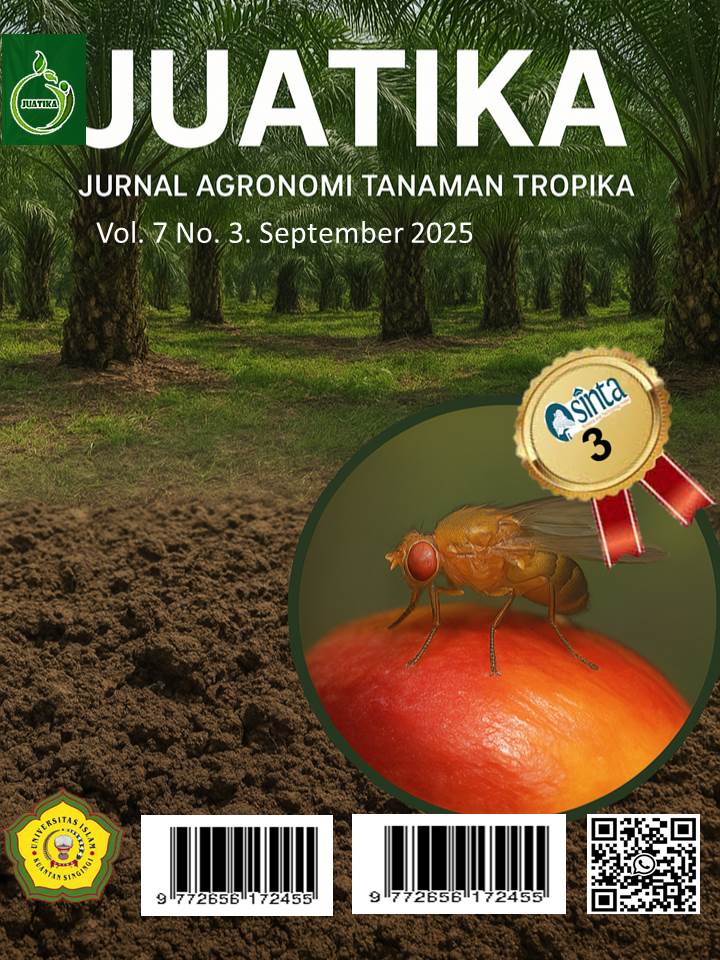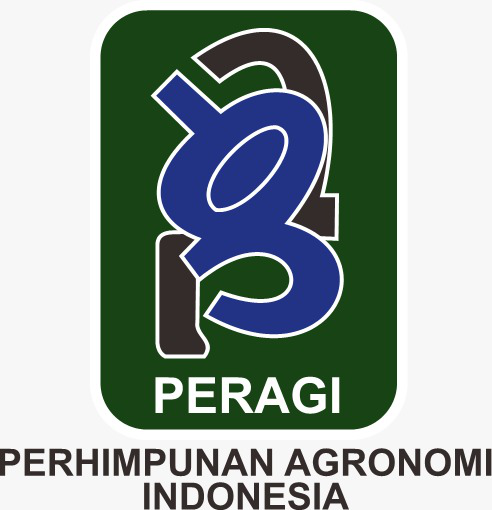Utilization of Subsurface Drainage to Reduce Salinity under Different Saline Soil Mixture Ratios and Their Effects on the Growth of Red Spinach (Amaranthus tricolor)
Abstract
Soil salinity is a significant limiting factor in plant growth, particularly in areas affected by salt accumulation. This study aims to analyze the effectiveness of underground drainage in reducing soil salinity through the leaching method and its impact on the growth of spinach (Amaranthus tricolor). The experiment involved applying saline soil mixtures at ratios of 25%, 50%, 75%, and 100% alongside non-saline soil while utilizing underground drainage to expedite the salt leaching process. The parameters observed included pH, electrical conductivity (EC), sodium (Na) content, and plant growth. Observations were conducted at 1, 10, 20, and 30 days, with three replications for each treatment. The results indicated that underground drainage significantly reduced soil salinity levels in a relatively short period. The decrease in salt concentration positively influenced spinach growth, particularly in treatments with lower saline soil mixture ratios. These findings suggest that underground drainage can serve as an effective solution to mitigate agricultural land salinity, thereby enhancing plant productivity.
Downloads
References
Anugrahtama, P. C., Supriyanta, S., & Taryono, T. (2020). Pembentukan bintil akar dan ketahanan beberapa aksesi kacang hijau (Vigna radiata L.) pada kondisi salin. Agrotechnology Innovation (Agrinova), 3(1), 20. https://doi.org/10.22146/a.58353
Elfarisna. (2018). Pemikiran untuk keberlanjutan pertanian. Angewandte Chemie International Edition, 6(11), 951–952.
Ester, G., Karuniawan, & Wicaksono, P. (2019). Respon 3 varietas pakcoy (Brassica rapa L.) terhadap simulasi cekaman salinitas. Jurnal Produksi Tanaman, 7(6), 1107–1114.
Junandi, J., Mukarlina, M., & Linda, R. (2019). Pengaruh cekaman salinitas garam NaCl terhadap pertumbuhan kacang tunggak (Vigna unguiculata L. Walp) pada tanah gambut. Jurnal Protobiont, 8(3), 101–105. https://doi.org/10.26418/protobiont.v8i3.36869
Karamina, H., Fikrinda, W., & Murti, A. T. (2018). Kompleksitas pengaruh temperatur dan kelembaban tanah terhadap nilai pH tanah di perkebunan jambu biji varietas kristal (Psidium guajava L.) Bumiaji, Kota Batu. Kultivasi, 16(3), 430–434. https://doi.org/10.24198/kultivasi.v16i3.13225
Khumairo, G. A., & Handayani, B. L. (2022). Habitus masyarakat di daerah kekeringan pada Desa Jatisari Kabupaten Situbondo. Journal of Urban Sociology, 5(1), 59. https://doi.org/10.30742/jus.v5i1.2050
Kusumiyati, K., Farida, F., Sutari, W., & Mubarok, S. (2018). Mutu buah sawo selama periode simpan berbeda. Kultivasi, 16(3), 451–455. https://doi.org/10.24198/kultivasi.v16i3.14385
Muharam, & Saefudin, A. (2016). Pengaruh berbagai pembenah tanah terhadap pertumbuhan dan populasi tanaman padi sawah (Oryza sativa L.) varietas Dendang di tanah salin sawah bukaan baru. Jurnal Agrotek Indonesia, 469(3), 319–323. https://doi.org/10.7868/S0869565216210155
Nasyirah, N., Kalsim, D., & Saptomo, S. (2015). Analysis of the rate of saline soil leaching by using subsurface drainage. Jurnal Keteknikan Pertanian, 3(2), 1–8. https://doi.org/10.19028/jtep.03.2.89-96
Rahman, A., Fachruzi, I., & Syarbini, M. (2025). Penambahan fraksi pasir dan amelioran terhadap sifat fisika dan kimia tanah salin yang sudah dilindi. Acta Solum, 1(1), 46–53. https://doi.org/10.20527/actasolum.v3i1.2845
Rinawati, Hidayat, D., Suprianto, R., & Sari Dewi, P. (2016). Penentuan kandungan zat padat (total dissolve solid dan total suspended solid) di perairan Teluk Lampung. Analit: Analytical and Environmental Chemistry, 1(1), 36–46. http://jurnal.fmipa.unila.ac.id/analit/article/view/1236/979
Romadloni, A., Karuniawan, D., & Wicaksono, P. (2018). Pengaruh beberapa level salinitas terhadap perkecambahan kacang hijau (Vigna radiata L.) varietas Vima 1. Jurnal Produksi Tanaman, 6(8), 1663–1670.
Sodik Imanudin, M., Bakri, B., & Tambunan, A. (2016). Kajian teknik aplikasi drainase bawah tanah dengan menggunakan bahan baku lokal. Planta Tropika: Journal of Agro Science, 4(1), 14–19. https://doi.org/10.18196/pt.2016.051.14-19
Soekamto, M. H., & Fahrizal, A. (2019). Upaya peningkatan kesuburan tanah pada lahan kering di Kelurahan Aimas Distrik Aimas Kabupaten Sorong. Abdimas: Papua Journal of Community Service, 1(2), 14–23. https://doi.org/10.33506/pjcs.v1i2.670
Supwatul Hakim, M., Hermayantiningsih, D., Riana Dewi, S., Ayu Andhita, N., & Jhonatan Krissilvio, E. (2023). Analysis of acidity and alkalinity levels in primary drainage canal IV Bukit Keminting, Palangka Raya, Central Kalimantan. Indonesian Journal of Chemical Research, 8(1), 57–66.
Sutrisno, J., Kholif, M. Al, & Rohma, A. N. (2020). Penerapan adsorbsi, pertukaran ion, dan variasi kualitas air sumur gali. Jurnal Sains dan Teknologi, 19(2), 69–75.
Wahyuningsih, S., Kristiono, A., & Taufiq, A. (2017). Pengaruh ameliorasi tanah salin terhadap pertumbuhan dan hasil kacang hijau. Buletin Palawija, 15(2), 69. https://doi.org/10.21082/bulpa.v15n2.2017.p69-77
Copyright (c) 2025 Naufal Firwansyah Tristanto, Purwadi, Fitri Wijayanti

This work is licensed under a Creative Commons Attribution 4.0 International License.
Authors who publish with Jurnal Agronomi Tanaman Tropika (JUATIKA) agree to the following terms:
Authors retain copyright and grant the Jurnal Agronomi Tanaman Tropika (JUATIKA) right of first publication with the work simultaneously licensed under a Creative Commons Attribution License (CC BY 4.0) that allows others to share (copy and redistribute the material in any medium or format) and adapt (remix, transform, and build upon the material for any purpose, even commercially) with an acknowledgment of the work's authorship and initial publication in Jurnal Agronomi Tanaman Tropika (JUATIKA).
Authors are able to enter into separate, additional contractual arrangements for the non-exclusive distribution of the journal's published version of the work (e.g., post it to an institutional repository or publish it in a book), with an acknowledgment of its initial publication in Jurnal Agronomi Tanaman Tropika (JUATIKA). Authors are permitted and encouraged to post their work online (e.g., in institutional repositories or on their website) prior to and during the submission process, as it can lead to productive exchanges, as well as earlier and greater citation of published work.







 More Information
More Information



